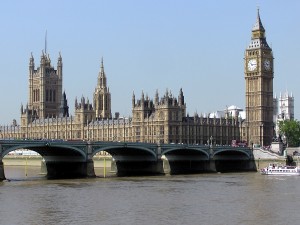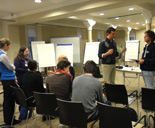WEDNESDAY, 26 JANUARY 2011
I first got involved with the Centre for Science and Policy after seeing an advert on the back of BlueSci magazine. I met with the incredibly enthusiastic Executive Director, Dr Chris Tyler, who offered me the opportunity to work at the Centre as an intern. I immediately took up his offer, and last summer I was able to contribute to the important work that the Centre does. It was an extremely valuable experience to see how a university centre operates and learn more about the vital work being done to encourage collaboration between researchers and policy makers.
In understanding the crucial role of the Centre it is important to realise that policy decisions that affect our lives are influenced by many factors. These can range from the current economic or political climate to the moral priorities of the policy makers. But should policy be based on these factors? No. As anyone with a vague understanding of science will tell you, it is crucial – wherever possible – to base our decisions on factual evidence rather than on whims of the times.
Unfortunately, evidence-based policies can be difficult to produce. Scientific work is often seen as rather inaccessible to laymen; scientists can find it difficult to clearly and accurately communicate information to non-specialists. Equally, policy makers do not always have the time or expertise to fully understand the evidence in front of them, and some do not know which channels to go through to contact relevant sources of information.
It is extremely important that these two groups interact with each other if we want to make sound, factually-based policy decisions. This is why the Centre works to develop a network of contacts between policy makers and scientists. It allows policy makers access to accurate up-to-date information, and scientists can ensure the full benefit of their research is being realised. Communication will be more effective if each side understands the constraints and working preferences of the other, so the Centre brings people together in joint sessions and meetings to ensure that the dialogue is successful for both sides.
A range of programmes are run by the Centre to encourage collaboration and understanding. The Policy Fellows Programme allows policy makers and members of industry to meet with a range of academics. Centre Interest Groups coordinate policy workshops and seminars on specific areas where science can affect policy decisions. The Professional Development work of the Centre will probably be of most interest to BlueSci readers. The Centre runs a programme for early career researchers to offer them an opportunity to learn about the policy process. This encourages engagement and knowledge transfer that will continue through their career and gives them opportunities to influence policy and see the benefits for themselves. More information on all the programmes can be found on the website, www.csap.org.uk.
The work done by the Centre to promote understanding and lasting communication between the scientific community and policy makers is vital to produce informed evidence-based policy that will have a beneficial impact on our everyday lives. CSaP wants to encourage interested students to get involved. Whether you would like to attend a talk, help at an event or come and intern as I did, do get in touch. It is a great opportunity to gain insight into an area where scientific research really can have huge impact. You can be involved in a huge range of projects where you will meet all kinds of very interesting people.
Nina Klein is a second year undergraduate in Natural Sciences and a CSaP Associate



